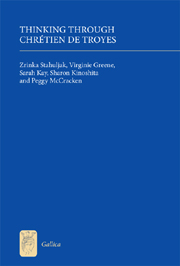Book contents
- Frontmatter
- Contents
- Preface
- Introduction
- 1 The “Changeful Pen”: Paradox, Logical Time, and Poetic Spectrality in the Poems Attributed to Chrétien de Troyes
- 2 Imagination
- 3 Adventures in Wonderland: Between Experience and Knowledge
- 4 Feudal Agency and Female Subjectivity
- 5 Forgetting to Conclude
- Epilogue
- Appendix I Sigla of the Principal Manuscripts of the Chrétien Romances
- Appendix II Lyric Texts, Textual Notes and Translations
- Appendix III Passages from Cligés for Comparison with Lyric Texts
- Appendix IV Variants to the “Cart Scene” in Le Chevalier de la Charrete
- Bibliography
- Index
- Title in the Series
4 - Feudal Agency and Female Subjectivity
Published online by Cambridge University Press: 05 February 2013
- Frontmatter
- Contents
- Preface
- Introduction
- 1 The “Changeful Pen”: Paradox, Logical Time, and Poetic Spectrality in the Poems Attributed to Chrétien de Troyes
- 2 Imagination
- 3 Adventures in Wonderland: Between Experience and Knowledge
- 4 Feudal Agency and Female Subjectivity
- 5 Forgetting to Conclude
- Epilogue
- Appendix I Sigla of the Principal Manuscripts of the Chrétien Romances
- Appendix II Lyric Texts, Textual Notes and Translations
- Appendix III Passages from Cligés for Comparison with Lyric Texts
- Appendix IV Variants to the “Cart Scene” in Le Chevalier de la Charrete
- Bibliography
- Index
- Title in the Series
Summary
Thus far we have been considering twelfth-century courtly literature, both lyric and romance, as a concrete, particularizing mode of thinking – an ad hoc exercise, “thinking on the spot,” in contrast to the universalizing impulse characteristic of more systematic strands of medieval thought. Despite the emerging emphasis on the self and the responsibility of the individual in contemporary spiritual and legal discourse, respectively, we called into question the automatism of the modern binary opposition between the internal-as-individual, on the one hand, and the external-as-collective, on the other. Thus in Chapter 2 we imagined, in the figure of Psychologic, “a psychology interested in the individual as emblematic of identity and identification, but not keen to explore internal processes as belonging to the privacy of the individual” (p. 63). In Chapter 3 we explored, among other things, the temporal dimensions of adventure as ethical and epistemological experimentation. In this chapter, we turn to “adventure” as the name for the interface between the male chivalric subject and his social and political world. As both the Poet and Psychologic would remind us, this is the world not of the cloister but of the court: not of disputatious clerks crafting long periodic phrases in Latin but of courtly beauties speaking French in all its charming, if messy, vernacularity. This shift in scene in turn allows us to introduce the question of female subjectivity, focusing on the figures of Enide and the lady of Landuc as feudal agents.
- Type
- Chapter
- Information
- Thinking Through Chrétien de Troyes , pp. 111 - 138Publisher: Boydell & BrewerPrint publication year: 2011

